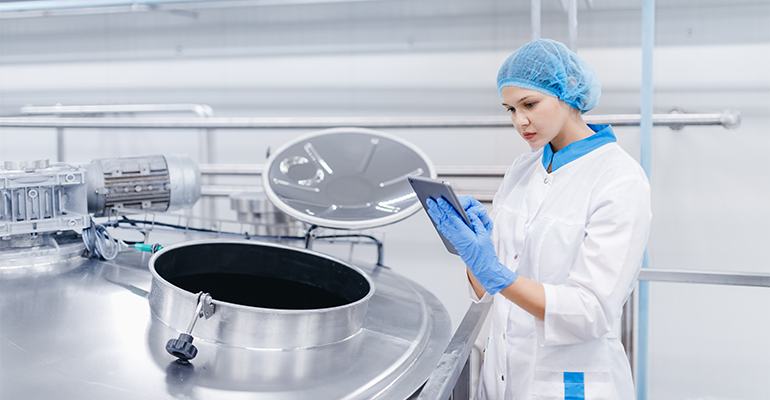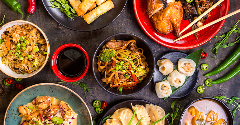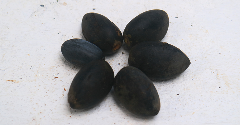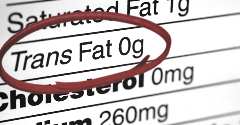‘Game-changing’ tech such as automation and synthetic biotechnology the future for manufacturing, VTT predicts
28 Jun 2022“Game-changing technologies” such as synthetic biotechnology – combining engineering principles with biology in natural production processes – and more automation could revolutionise European food manufacturing, as well as for a host of other sectors in the coming years.
The predictions are part of VTT Technical Research Centre of Finland’s white paper on the future of sustainable industrial manufacturing, in which it also forecasts minimised environmental footprints for factories and more “circular” value chains.

The state-owned and controlled non-profit research and technology company highlighted the sweeping size of the EU-27 area’s overall manufacturing sector, including more than 2 million enterprises in 2019 – around 10% of all enterprises in the non-financial business economy – 32.1 million jobs and more than €2 billion in gross value added.
However, a host of key driving factors will mean big changes for the manufacturing sector over the next decade and beyond, according to Karoliina Salminen, VTT’s lead in smart manufacturing, and other authors on the white paper.
Ongoing societal change a driver for change
These ongoing driving changes include a growing transition to climate neutrality among societies including EU legislature aiming to reduce net greenhouse emissions by at least 55% by 2030, and increasing focus on reducing waste through circular production chains – which reuse ingredients and equipment as long as possible.
Covid-19 has also highlighted “insufficient resilience” among critical value networks, which, in tandem with increasing personnel shortages, mean automation of European manufacturing chains has become a top priority.
“New generations are looking for meaningful work careers that aren’t based on dull and repetitive tasks,” said the authors. “Thus, industries need to rethink how to attract future workers and, at the same time, motivate and reskill current personnel.”
Challenge of synthetic biotechnology in foods
Together, the driving factors will lead to a “clear transition towards a more sustainable and resilient industry”, the authors said.
This includes the ongoing shift to using recycled materials and green energy, “along with focusing on resource-efficient, demand-driven production and circular value chains”, they added.
Circular strategies will strive to use less primary, scarce or harmful materials, which will require big changes for older manufacturing processes. But the “diversity of circular or bio-based materials and recycled components and products entering the production lines is a tremendous challenge to the manufacturing itself,” the authors warned.
“In the long term, game-changing technologies, such as synthetic biotechnology, which combines engineering principles with biology and utilises natural processes to fabricate materials and products, can revolutionise the production of, for example, pharmaceuticals, fuels, chemicals, textiles, electronics and food,” they said.
“Moreover, sustainable and circular industries are getting electrified and exploring new green energy solutions that replace fossil-based energy sources.”
Automation, digital, robotics and AI
The challenges faced by manufacturers in food and other sectors to adopt circular strategies will require “even more advanced digital and autonomous solutions,” the authors said, adding the robotics and artificial intelligence (AI) will play a key role here.
“With higher levels of autonomy, production expertise no longer relies on a single person. Intelligent learning systems support the sharing of information in the whole work community.
“Knowledge can be gathered, shared and scaled between manufacturing units, factories, supply networks and product series. This allows faster and more cost-efficient modifications and ramp-ups for new products and their variations.”
The adoption of more automated manufacturing processes will also result in a “self-healing and self-learning processes”. This will change the way industrial workers are utilised, the authors added, making digital skills the core, in place of the traditional production lines.
Practical & bold: The six steps to be taken
The authors went on to stress that this transition towards more sustainable manufacturing will not be easy, and requires some “practical and bold steps from each stakeholder in the manufacturing system”.
It summarised these in six key steps, prompting more open sharing between manufacturing stakeholders:
- Adopting shared visions and targets between manufacturers
- Increasing data transparency and accuracy throughout industry
- Redesign of manufacturing processes and life cycles, adopting more autonomous processes and taking an “end-to-end” view of processes
- Redesigning products and production processes to be more autonomous
- Developing and investing in key capabilities for a sustainable transition
- To “go beyond” – creating new products and services that are not possible with more traditional methods and business models.
VTT speculated: “What if the future product is manufactured from the customer’s recycled material close to them in just a few days? What if a new company controls the data platform that offers the manufacturing capacity of several factories? What if a worker could monitor and control several factories from their summer cottage using XR technologies through industrial metaverse?”
Related news

Chinese food brand wants to give customers ‘the full experience’
16 Dec 2022
Food brand Xiao Chi Jie is revamping Chinese cuisine for the modern American consumer. The Washington-based company sells regional Chinese specialties like soup dumplings, noodle kits, and barbeque skewers direct-to-consumer in the US.
Read more
Regulations spur healthy snacking in Europe
15 Dec 2022
Healthy snack demand is on an upward trajectory in Europe, fuelled by products attaching health halos to their products, according to latest figures by Euromonitor – but regulations may be the real driver.
Read more
Could the EU-Mercosur trade deal be revived?
14 Dec 2022
The re-election of Luiz Inácio da Silva, or Lula, as president of Brazil has prompted speculation that the free-trade agreement between the EU and South American Mercosur bloc could be revived – but the European farming sector has concerns.
Read more
Could menopause-supporting products be the next big opportunity?
13 Dec 2022
As supplement brands launch products to relieve the symptoms of menopausal women such as nutraceutical gummies, the unmet needs of this group is attracting government attention in the UK.
Read more
Plant-based fish and seafood launches around the world
12 Dec 2022
From pea protein-based prawns to microalgae-based tuna alternatives, plant-based alternatives to fish and seafood are on the rise around the world.
Read more
Editors’ choice: Our roundup of the most innovative sweets, snacks and bakery products
9 Dec 2022
The sweets, snacks, and bakery categories are an exciting area, full of fresh and innovative products which are constantly adding meaningful value to the sector.
Read more
Functional food in Japan centres on health and proving claims
8 Dec 2022
The latest Japanese functional food and drink trends put health and product efficacy firmly on the production agenda for new releases.
Read more
Swedish food agency: One in 10 coffee brands contain excess acrylamide
7 Dec 2022
New findings from the Swedish Food Agency have revealed three of 29 coffee products sampled contained acrylamide above limits, reinforcing the link between levels and degree of roasting.
Read more
‘Super nut’? Indonesia’s ‘best kept secret’ wins EU novel food approval
6 Dec 2022
A previously obscure, nutrient-rich Indonesian nut is set to hit European shelves after winning EU novel foods approval that could also help protect under-threat kenari forests on the archipelago.
Read more
Philippines to restrict trans fats in processed foods
5 Dec 2022
Use of artificial trans fats in pre-packed processed foods will be restricted in the Philippines as the country looks to eliminate its consumption from other sources too.
Read more